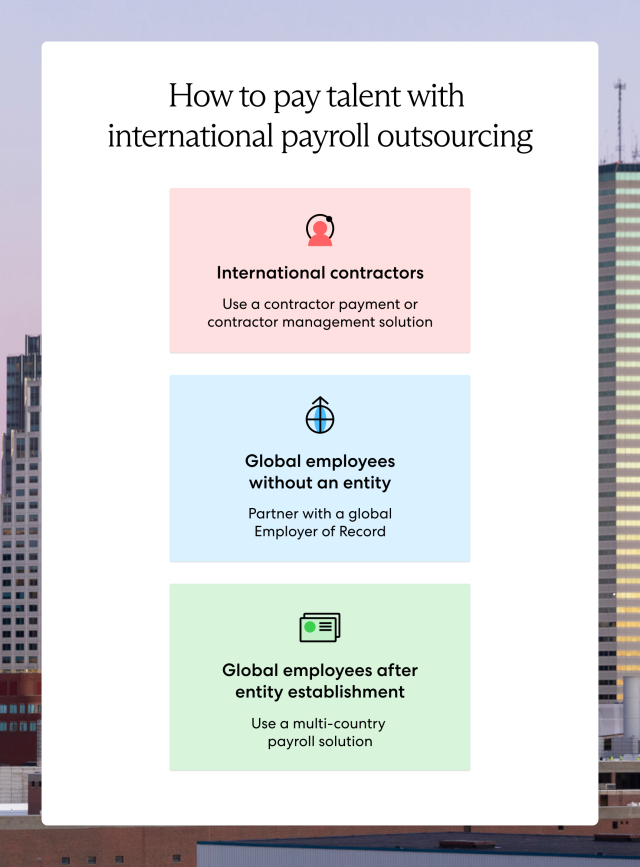International payroll outsourcing is the process of partnering with a payroll provider to accurately and compliantly pay foreign contractors and employees, no matter where they’re located.
The process of outsourcing international payroll operations involves partnering with a third-party provider to handle global payroll, including:
- Delivering payroll consistently and on time
- Organizing, managing, and reporting payroll taxes
- Ensuring compliance with all government payroll regulations
- Safeguarding company and client data
- Providing HR and finance support
Workforce needs differ worldwide, but one universal requirement can’t be overlooked: employees must get paid fully and on time, regardless of their location. For international companies, outsourcing payroll ensures their global payroll processes follow local laws and financial regulations.
This solution proves particularly valuable for companies expanding into new markets or managing remote global teams. The provider takes responsibility for navigating complex international banking systems, managing multiple currencies, and ensuring compliance with local labor laws and tax regulations.
Use this guide to discover how to pay global talent using international payroll outsourcing.
Importance of international payroll outsourcing
Organizations that expand globally face numerous challenges in managing their international workforce. Understanding the key benefits of international payroll outsourcing helps business leaders make informed decisions about their global operations:
- Ensures compliance. International payroll providers maintain dedicated teams of experts who stay current with evolving regulations across multiple jurisdictions. This expertise helps organizations meet complex tax requirements and labor laws while reducing the risk of costly compliance violations.
- Scales with growth. As companies expand globally, outsourced payroll solutions adapt seamlessly to support operations in new markets without requiring additional infrastructure or local entities. Such scalability enables rapid market entry and efficient management of a growing international workforce.
- Increases efficiency. By automating routine tasks and centralizing payroll operations, outsourcing can reduce processing time and administrative burden. This lets internal teams focus on strategic initiatives rather than time-consuming payroll administration.
- Enhances employee satisfaction. Professional payroll management ensures consistent, accurate, and timely payments across all regions, directly impacting employee trust and retention.
- Mitigates risk. Outsourcing partners implement robust security measures and quality control processes to protect sensitive data and prevent costly errors. Their specialized expertise helps companies avoid penalties and maintain compliance with local regulations across multiple jurisdictions.
Challenges of international payroll outsourcing
While international payroll outsourcing offers numerous benefits, organizations should carefully consider and prepare for several key challenges that can impact successful implementation:
Data security
Protecting sensitive employee information presents a significant challenge in international payroll outsourcing. Organizations must ensure their providers maintain robust encryption protocols, access controls, and compliance with various data protection regulations. A single data breach can result in severe financial losses and damage a company’s reputation.
Integration hurdles
Manual data handling between different systems can consume significant time and resources. A global payroll benchmarking survey from Deloitte found that 30% of organizations identify manual data entry as their most time-consuming payroll processing task. Integrating outsourced payroll systems with existing HR platforms requires careful planning to avoid disruptions in data flow and reporting accuracy.
Communication barriers
Language differences and time zone variations can create significant obstacles in payroll management. These barriers often lead to delays in processing updates or resolving urgent payroll issues. Clear communication channels and established protocols are essential for efficient operations across different regions.
Vendor selection
Finding the right payroll provider requires careful evaluation of their global capabilities and industry expertise. Organizations must assess potential vendors’ track record in managing international payroll operations, compliance knowledge across different jurisdictions, and ability to scale with business growth. The wrong decision can result in costly errors and compliance issues.
Loss of control
When outsourcing payroll operations, companies often struggle with reduced visibility and control over their payroll processes. This can make it challenging to monitor performance effectively or implement quick changes when needed. Organizations must balance the benefits of outsourcing with maintaining adequate oversight of their payroll operations.
Key components of international payroll outsourcing
International payroll outsourcing encompasses several critical elements that work together to ensure accurate and compliant global workforce compensation. Here’s a detailed look at the essential components:
Payroll processing
The core function involves complex calculations and payment distribution across multiple countries. This includes processing gross-to-net salary computations, managing various deductions, and handling currency conversions. Global payroll services automate these calculations while ensuring accurate payment delivery in local currencies, reducing processing time and minimizing errors.
Compliance management
A fundamental aspect of international payroll involves navigating diverse regulatory frameworks. Providers maintain dedicated teams who stay current with local labor laws, tax regulations, and reporting requirements across jurisdictions. Global compliance expertise helps organizations avoid costly penalties while ensuring adherence to country-specific employment standards and statutory requirements.
Benefits administration
Managing employee benefits requires careful attention to both mandatory and voluntary programs. This includes healthcare plans, retirement contributions, paid time off, and region-specific statutory benefits. The provider ensures proper calculation and distribution of benefits while maintaining compliance with local requirements for mandatory contributions.
Tax filing and withholdings
Professional providers handle all aspects of tax compliance, including calculating correct withholding amounts, managing social security contributions, and submitting timely filings to appropriate authorities. They ensure accurate tax calculations across different jurisdictions while maintaining proper documentation for audit purposes.
Employee support
Modern international payroll services provide comprehensive support systems for employees. This includes access to self-service portals for viewing pay statements, downloading tax documents, and submitting payroll-related queries. Support services often operate across multiple time zones and languages to promptly resolve employee concerns.
What are the advantages of international payroll outsourcing?
Using an international payroll partner has many advantages that help save money over time, limit errors, and ensure consistency in payments. By outsourcing international payroll to a partner provider, a company can:
Reduce costs
Payroll outsourcing saves money by reducing errors and the need to pay fees or process off-cycle payments. Payroll outsourcing also eliminates hiring an internal team, reducing overall business costs.
Save time
Payroll outsourcing saves time during global expansion by removing the requirement for local entities or local payroll providers in each country. Outsourcing payroll gives companies country-specific payroll support and the option for payment automation.
Ensure compliance
One of the most important aspects of international payroll is ensuring that every part of the payroll process complies with fair labor standards and government regulations—from following statutory pay periods to withholding the appropriate taxes and more.
With help from an outsourced partner, a business ensures full global payroll compliance with laws and regulations in both its home country and new international markets.
What are the disadvantages of international payroll outsourcing?
Outsourcing is not a perfect solution to combating global payroll challenges. When putting payroll into the hands of a third-party provider, issues may still arise, including:
Mistakes and errors
Even with an outsourced payroll partner, mistakes still happen, which can lead to retro pay or more serious legal penalties. From typos to missed zeros, some of the most common payroll errors include:
- Miscalculating taxes and pay
- Not reporting all tax forms
- Forgetting to track overtime
- Missing information or forms
Mistakes are more likely to occur with a new and inexperienced provider. This is why hiring an outsourced payroll provider with a proven track record of accuracy and success is essential.
Delays in payment
Most outsourced payroll partners allow for faster delivery of all payments, but there can be delays. This is especially true for international companies, where payroll involves multiple local authorities and varying payroll rules. If left uncommunicated or unresolved, late payments can be considered a “willful” act of non-payment against an employee and may result in legal action.
Targeted security risks
International payroll platforms typically rely on cloud-based software to store data and complete payroll. While these platforms have security, including firewalls and encrypted servers, they are a prime target for cybercriminals. For payroll, relying on software can become a significant issue if certain platforms are breached and employee data is stolen or corrupted.
How to pay talent with international payroll outsourcing
Several solutions are available for global employers looking to outsource their international payroll. Selecting the best payroll solution for an international team depends on whether the business pays an employee or contractor and if the company has an established entity in the country.

Paying international contractors
When attempting to pay foreign contractors, companies face issues related to currency exchange, payment timeliness, and misclassification of a contractor’s status. For example, if a contractor is misclassified as an employee, the employer is responsible for noncompliance penalties and fines.
To mitigate the risks of international payments and misclassification, employers turn to contractor payment and contractor management solutions. With contractor solutions, companies gain access to automated and compliant payments across the globe.
Paying foreign employees without an entity
When it comes to global expansion, many businesses test out a new foreign market to determine its viability and profitability. To directly employ talent within this new market, companies must establish a legal business entity, an expensive process costing up to $20,000 that takes about two months to set up.
To bypass the need for a local entity, many businesses partner with a global employer of record (EOR). By using a global EOR, companies get an all-in-one, flexible solution for compliantly hiring and paying talent overseas. Benefits of a global EOR partner include quicker setup times, lower financial commitment, global reach, and compliant employment.
Learn more: What Is an Employer of Record (EOR)?
Paying global employees after entity establishment
To grow significantly in various international markets, businesses can establish multiple local entities and legally employ talent within each country. However, challenges in payroll processing across various countries still arise.
However, with a global payroll service, businesses set up automated, on-time payments, enabling accurate and consistent payroll, regardless of the employee’s location. This provides one centralized solution for processing payroll for global teams.
Outsource to an international payroll partner today
International growth requires the proper infrastructure, tools, and expertise. Velocity Global’s Employer of Record (EOR) solution helps businesses quickly transition into new markets and conduct complex operations like international payroll with far less risk.
With entities in over 185 countries and a cloud-based Global Work Platform™ that connects businesses with international employees, Velocity Global has the tools and expertise to make global expansion easier. Reach out to learn more.



